#bhagavadgita
Text

"Those who are devoted and have love for Me, in their constant contemplation of Me, their lives intertwined with Mine, they illuminate each other with their knowledge of Me, and their conversations are filled with the joy and contentment they find in Me."
~Bhagavad Gita 10.9
#krishna#love#bhakti#devotion#flute#gita#bhagavatam#art#beauty#bhagavadgita#radharaman#radhakrishna#radharani#vishnu#hare krishna#bhagavad gita#iskcon#srila prabhupada
177 notes
·
View notes
Text
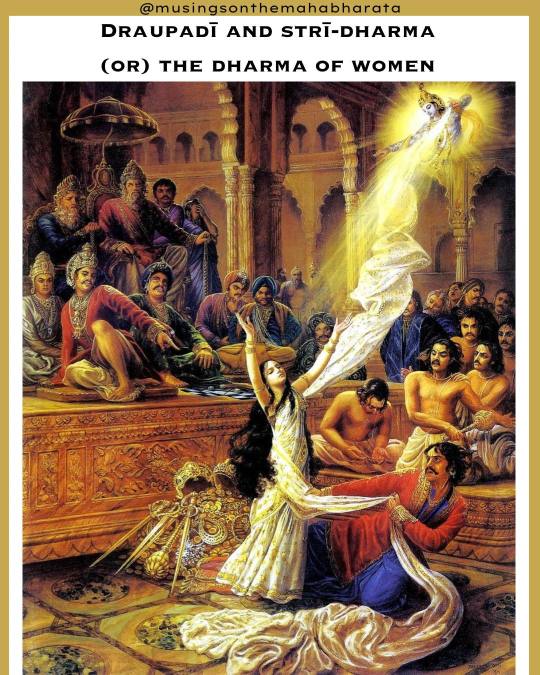
Draupadī and the Dharma of Women
"Strī" translates from Sanskrit as "woman", while "dharma" is a complex principle with manifold meanings, in this context bearing the significance of "duty"; in simple terms, it refers to an individual conduct that contributes to harmony in a greater framework, be it societal or cosmological.
Draupadī is lauded in the Critical Edition of the Mbh several times as being the epitome of strī-dharma, of the dharma of women. (2.62.20; 2.63.25-30; 2.64). Interestingly, she is most intensely praised as such after she angrily (yet elegantly!) questions the men of the royal court and demands justice, being anything but meek and demure. I would argue that this showcases that in the Mahābhārata voicing oneself and standing up for oneself are considered responsibilities belonging to the dharma of women.
To nuance this even more, Eknath Easwaran, an eminent translator of the Bhagavadgītā, highlights that, etymologically, the term "dharma" can be traced back to the root 'dhri', which means 'to support, hold up, or bear'; "dharma" therefore translates as "that which supports", and Draupadī's conduct therefore supports both society and cosmology.
In the Sanskrit Mbh, Kṛṣṇa does not appear in the sabhā (royal hall) at the time of Draupadī's attempted disrobing, and no direct mention of him is made during this episode. In a conversation with Dr. Brian Black, a Mbh researcher whom I had the honour to have as my MA supervisor, we talked about the implication of this, which is that Draupadī's adherence to strī-dharma appears to be that which shields her. A question that could arise here could be whether there is a contradiction between the Critical Edition and modern renderings of the Mahābhārata, with Draupadī being shielded by her dharma as opposed to by Kṛṣṇa.
For me there is no contradiction.
Kṛṣṇa in the Bhagavadgītā establishes himself as 'the eternal dharma' (14.27); and so, Kṛṣṇa is all dharmas, including strī-dharma. We tend to associate Kṛṣṇa with a fully-fledged incarnation; but he is beyond that. I would maintain that, as the divine principle, he exists in Draupadī's consciousness and in her actions as dharma (and not only!). The latter renditions, for me, in which he is physically there, only bring forth in tangible projections the internal process extending Draupadī's consciousness.
You can find me on IG: @musingsonthemahabharata.
Painting: Jadurani Dasi, 1986.
#mahabharata#mahabharat#draupadi#krishna#draupadi's disrobing#hindu art#mahabharatam#panchali#hindu mythology#hinduism#hindu#hindu philosophy#itihasa#sanskrit#phd#phd scholar#dharma#stri dharma#bhagavadgita#bhagavad gita#bhakti#vishnu
73 notes
·
View notes
Text
DAY 625
The first to apologize is the bravest. The first to forgive is the strongest. And the first to forget is the happiest.
#vibes#bhagavadgita#self healing#affirmations#positivevibes#spirtuality#motivating myself#law of attraction#karma#meditation#wisdom#willpower#sanathanadharma#srikrishna#happiness#love#peace
25 notes
·
View notes
Text
How to control mind?
Arjuna asked:
Oh! Krishna, since the mind is unsteady, turbulent, obstinate, and very strong,
controlling the mind is more difficult than controlling the wind."
(Bhagavad Gita 6:34)
Shri Krishna answered: "Arjuna, no doubt the mind is very difficult to control.
However, it can be controlled by constant practice and detachment." (Bhagavad Gita 6:35)
Without DETACHMENT to people and things, MIND cannot be controlled.
Shri Krishna said :
When a person constantly thinks about objects attachment to those objects arises in the mind
From attachment, desire is born and
from desire, anger is born
From anger comes delusion
from delusion comes the loss of memory.
From the loss of memory comes the destruction of intellect
and once the intellect is destroyed, the Person perishes. (Bhagavad Gita Chapter 2: 62, 63)
#krishna#hare krishna#chakras#harekrishna#lordkrishna#Pisces#vishnu#vishnupuran#lordvishnu#bhagavatam#mahabharata#srimadbhagavatam#bhagwan shiv#shrimadbhagwatgeeta#bhagvadgita#bhagavadgita#bhagwan#bhagwatgeeta#bhagavan sri ramana maharshi#bhagavadgītā#bhagwad gita#bhagwatgita#Sagittarius#gitavali#gita#enlightenment#sweet surrender#spiritual enlightment#enlightenyourself#enlightenedconsciousness
125 notes
·
View notes
Text
KARMA YOGA - NON DOERSHIP

All actions are being done by the forces of nature, but a human being deluded by the I-sense imagines, “I am the doer.”
They who sees that all actions are performed by nature alone and thus that they are not the doer—they see truly.
The Self - Consciousness, abides as the heart of all beings, O Arjuna, causing all beings to act by it's power of Maya, as if they are mounted on a machine.
-The Bhagavad Gita
#advaita#nonduality#spiritual#spirituality#yoga#meditation#hinduism#freedom#self inquiry#peace#bhagavadgita#lord krishna#krishna#arjuna#gita#mahabharat#rrr film#self realization#self knowledge#jnana yoga#knowthyself#know thyself#bhakti#devotion to god#devotional#daily devotion#godbless#karma yoga#karmaquotes#yoga motivation
105 notes
·
View notes
Photo
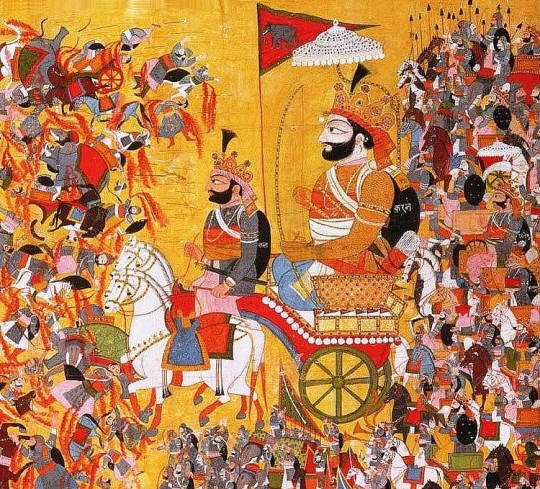
Mahabharata
The Mahabharata is an ancient Indian epic where the main story revolves around two branches of a family - the Pandavas and Kauravas - who, in the Kurukshetra War, battle for the throne of Hastinapura. Interwoven into this narrative are several smaller stories about people dead or living, and philosophical discourses. Krishna-Dwaipayan Vyasa, himself a character in the epic, composed it; as, according to tradition, he dictated the verses and Ganesha wrote them down. At 100,000 verses, it is the longest epic poem ever written, generally thought to have been composed in the 4th century BCE or earlier. The events in the epic play out in the Indian subcontinent and surrounding areas. It was first narrated by a student of Vyasa at a snake-sacrifice of the great-grandson of one of the major characters of the story. Including within it the Bhagavad Gita, the Mahabharata is one of the most important texts of ancient Indian, indeed world, literature.
Learn more about Mahabharata
100 notes
·
View notes
Text
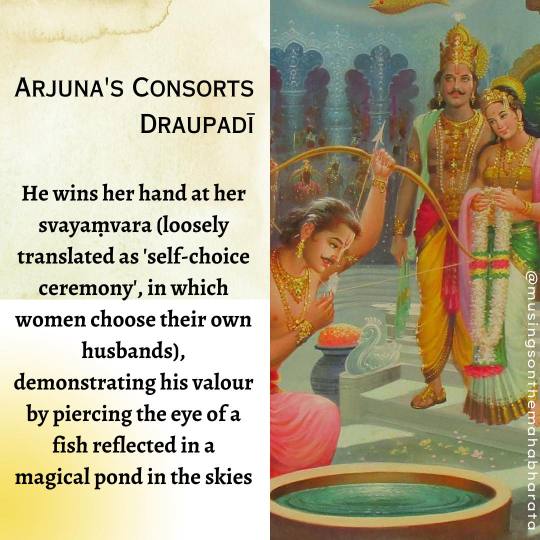
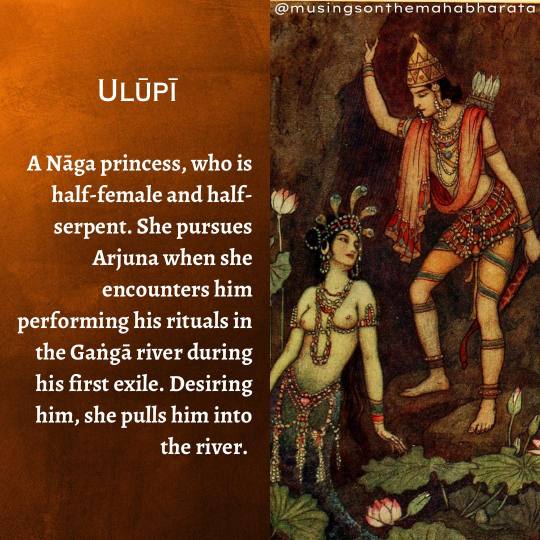
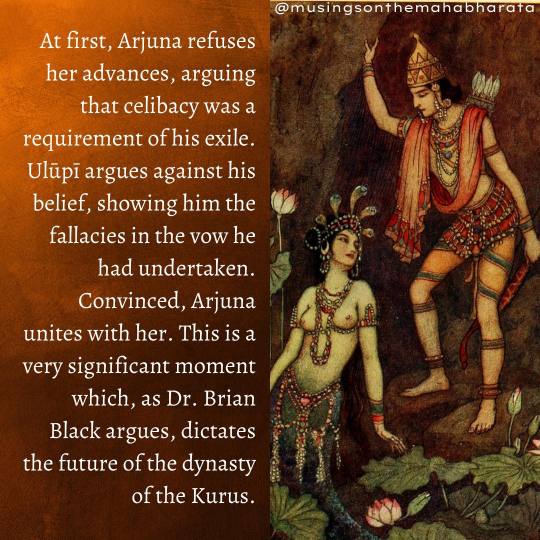
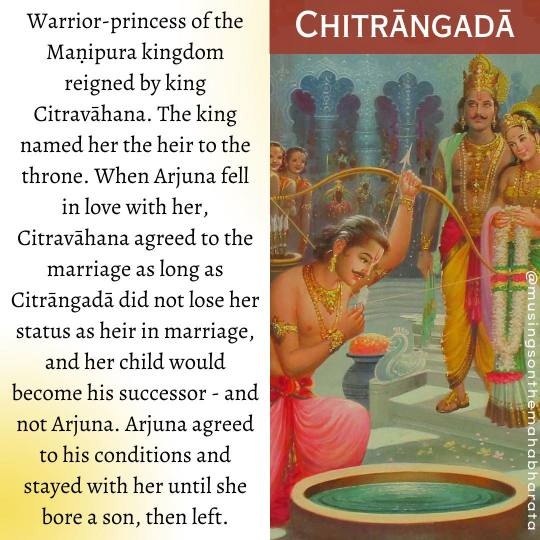


Arjuna's consorts!
#mahabharata#mahabharat#arjuna#arjun#mahabharatam#itihasa#sanskrit#hinduism#hindu art#phd#phd student#phd thesis#subhadra#draupadi#ulupi#chitrangada#bhagavad gita#bhagavadgita#krishna#yajnaseni
35 notes
·
View notes
Text
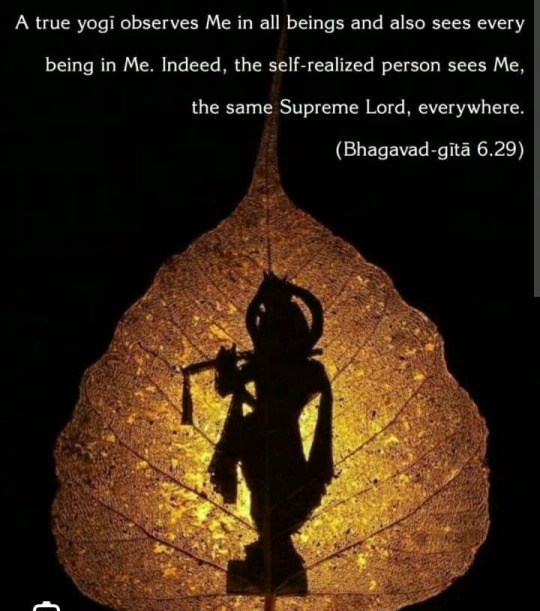
Jesus said the exact same thing!
Who has seen me has seen the father. The father is in me as I am in the Father. The Father and I are One.
Jesus claimed divinity, but he never claimed it exclusively. He said “you are all gods”. We are all children of God and these statements of Jesus apply to us all.
The God the Father is our true Self.
#meditation#philosophy#spirituality#enlightenment#mindfulmeditation#mantra#illumination#mysticism#gnostic#god#jesus#religon#spiritual enlightment#nonduality#nondualism#advaita#hare krishna#krishna#bhagavadgita#gospel#god the father#gnosis#hallelujah#vedanta#universalism#unitarian
10 notes
·
View notes
Text
“To love without condition, to talk without intention, to give without reason, care without expectation, that's the spirit of true love.”
-Lord krishna
#lord krishna#love#love quotes#karma#quote#quotes#bhagvadgita#hindusim#inspiring quotes#book quotes#quotes on tumblr#life#life quote#truth#reality#real love#bhagavadgita#sri krishna#care
271 notes
·
View notes
Text
“We must act in a selfless spirit, Krishna says, without ego-involvement and without getting entangled in whether things work out the way we want; only then will we not fall into the terrible net of karma. We cannot hope to escape karma by refraining from our duties: even to survive in the world, we must act.”
—Bhagavad Gita
#selflessness#karma quotes#bhagavadgita#actions speak louder than words#actions#spiritual quotes#spirituality#spiritual awareness#spiritualhealing#spiritualguidance#spiritualjourney#spiritualinspiration#spiritual knowledge#spiritualpath#spiritual wisdom#kind words#information#age of aquarius#ascension#spiritual awakening#spiritualawakening#spiritualgrowth#spread love#spiritual healing#spiritual#spiritual ascension#spiritual development#spiritualawareness#awareness#self actualization
14 notes
·
View notes
Text
“Do everything you have to do, but not with ego, not with lust, not with envy but with love, compassion, humility, and devotion.” – Lord Krishna
#krishna#hinduism#bhagavadgita#love quote#@twitter#culture#religion#thoughtful#quotes#life quote#spiritual quotes#quotations#inspiring quotes#karma
136 notes
·
View notes
Text


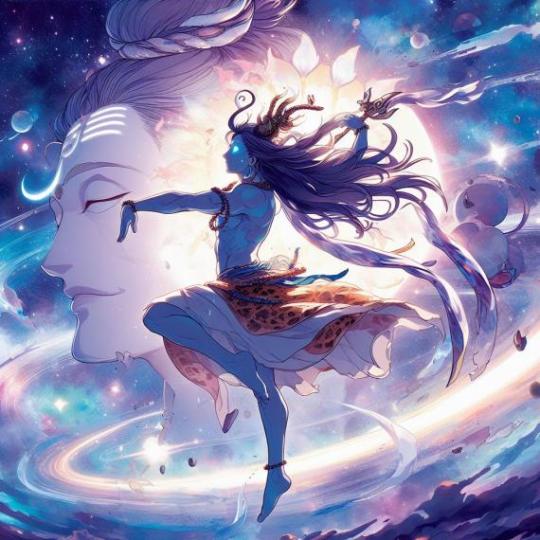
Might I be the most tamasik (ignorant) creature in the cosmos, but knowledge disguised as love flows through you, Bhagavan! Idolizing you makes my heart soft. This tamas is bliss!
#lord shiva#krishna#love#bhakti#devotion#beauty#art#shiva#mahadev#bhagavadgita#gita#flute#bhagavatam#shivaparvatiblessings#parvati#ramayana
163 notes
·
View notes
Text
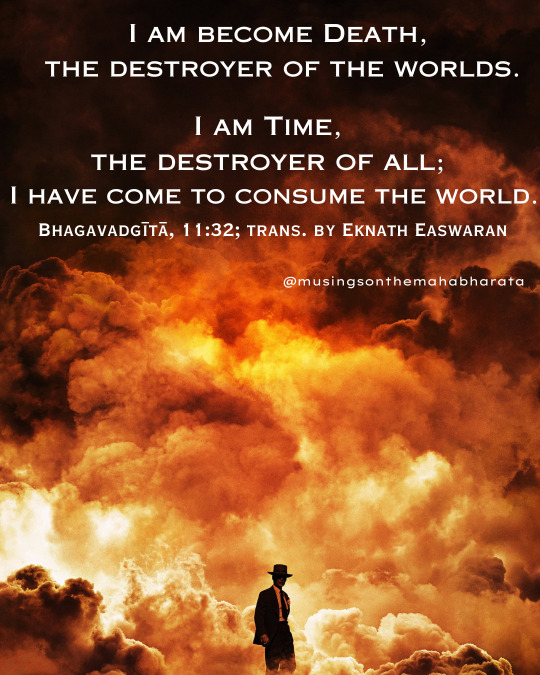
Now I am become Death, the destroyer of the worlds.
*Note, a more accurate translation is:
I am Time, the destroyer of all; I have come to consume the world.
BG: 11:32; trans. Eknath Easwaran.
Sometime ago, I was involved in a discussion about whether it was blasphemous for Oppenheimer to have quoted from the Bhagavadgītā upon seeing the explosion triggered by the atomic bomb he constructed. I was of the opinion that it was not. The opposing view was that Kṛṣṇa’s demolition was one of divine nature, whereas Oppenheimer’s manmade atomic bomb was not. Whereas, in this perspective, Kṛṣṇa’s violence and destruction were justified through Kṛṣṇa’s inherent divinity, Oppenheimer’s humanness disfigured his destruction with greed and impunity.
I would maintain that, to one adhering to a non-dual outlook, there is no separation between Kṛṣṇa’s violence in the Bhagavadgītā (or, more accurately, in the Mahābhārata) and Oppenheimer’s manmade, humane violence. Violence is violence, and divinity (or Consciousness) is inherent in the fabric of that, as it is in all that is. The genius of Oppenheimer’s brain which created such a formidable and terrible invention functions on the same patterns that enable and are Kṛṣṇa’s destruction. There is nothing more inherently divine in death by astras (supranatural weapons controlled and imbued by mantras central to the Kurukṣetra war) than death by atomic bomb.
Not only do I argue that it was not blasphemous for Oppenheimer to quote the BG and internalise his work through its prism (and, incidentally, is blasphemy anything but a dual social construct? Can Consciousness be blasphemous of itself?), but I argue that this is exactly how the Bhagavadgītā is lived in direct experience. The Bhagavadgītā and the Mahābhārata are not lifeless ancient texts that are only accessible or relevant in an esoteric, abstract realm. The BG and the Mbh are lived here and now, from a moment to moment unfolding. I would maintain that we cannot pick and choose what we like from these texts or what aligns to our morals (such as teachings on goodness) and disregard the rest — or take it metaphorically. The last parvas of the Mbh are incredibly violent and include gory descriptions of war, and the BG occurs on the battlefield of said war. This, in my view, does not signify that the texts glorify violence — no more than they glorify any other aspect of creation. It is a sign that violence exists as a natural development of the triadic cycle of creation (creation — preservation — destruction), and it is a manifestation of Consciousness.
The Bhagavadgītā coming alive to Oppenheimer upon witnessing his own potential for destruction is a testament to the BG’s existence in the collective consciousness as an expression of truth, pulsing and flowering for the one who expands their individual consciousness enough to tap into it and to allow it to manifest through themselves.
#krishna#bhagavadgita#mahabharata#mahabharat#oppenheimer#film#film review#christopher nolan#robert oppenheimer#cillian murphy#nonduality#nondual#philosophy#hindu philosophy#eastern philosophy
21 notes
·
View notes
Text
DAY 552
Do not get upset with people or situations, both are powerless without your reaction.
#vibes#bhagavadgita#self healing#affirmations#positivevibes#spirtuality#motivating myself#law of attraction#karma#meditation#wisdom#willpower#sanathanadharma#srikrishna#happiness#love#peace
34 notes
·
View notes
Text
I have read many times that if you love Lord Krishna, then you are very lucky because Krishna has selected you as a devotee. Is it true that Lord Krishna selects his devotees?
Yes, it is true that Lord Krishna selects His devotees. The Bhagavad Gita says, "The Supreme Lord is not obtained by expert explanations, by vast intelligence, or even by much hearing. He is obtained only by one whom He Himself chooses. To such a person, He manifests His own form." (Bhagavad Gita 7.23)
This does not mean that Krishna is arbitrary in His selection of devotees. He chooses those who have a sincere desire to know and love Him. He also chooses those who are willing to follow His teachings and surrender to His will.
If you feel a deep love and devotion to Lord Krishna, then you are indeed one of His chosen devotees. This is a great blessing, and it is something to be cherished.
It is important to note that Krishna's selection of His devotees is a mystery. We cannot fully understand why He chooses some people and not others. However, we can trust that His choices are always for the best.
If you are a devotee of Lord Krishna, then be grateful for the privilege of serving Him. And if you are not yet a devotee, then open your heart to Krishna and allow Him to choose you.
#bhagavadgita#bhagavatam#bhagvadgita#bhagwad gita#bhagwan#bhagavadgeeta#vedas#vedic astrology#vedic jyotish online#vedic astro observations#harekrishna#krishna#hare krishna#lordkrishna#astrology#bhagavad gita#bhagavadgītā#astrology numerology vedicastrology#bhagwan shiv#bhagwadgeeta#bhagwatgeeta#shrimad bhagwat katha#bhagawadgita#spiritual awakening#spiritualawakening#spiritual enlightment#spirituality#enlightenyourself#enlightenment#enlightenedconsciousness
33 notes
·
View notes
Text
Merry Christmas!
Dear Bhagavad Gita Community,
Merry Christmas to you all! On this joyous occasion, I would like to share with you some texts from the Bhagavad Gita and the Christian Theology that highlight the themes of peace and love.
The Bhagavad Gita teaches us that God is the source of all peace and love, and that we can attain these by surrendering to Him whole-heartedly. As Krishna says in Chapter 18, Verse 62:
तमेव शरणं गच्छ सर्वभावेन भारत |
तत्प्रसादात्परां शान्तिं स्थानं प्राप्स्यसि शाश्वतम् || 62||
Surrender exclusively unto Him with your whole being, O Bharat. By His Grace, you will attain perfect Peace and the eternal abode.
The Christian Theology also affirms that God is love, and that He has shown His love for us by sending His Son, Jesus Christ, to be our Savior and Lord. As John writes in his first epistle:
God is love. Whoever lives in love lives in God, and God in them. This is how love is made complete among us so that we will have confidence on the day of judgment: In this world we are like Jesus. There is no fear in love. But perfect love drives out fear, because fear has to do with punishment. The one who fears is not made perfect in love. We love because he first loved us. (1 John 4:16-19)
Both the Bhagavad Gita and the Christian Theology invite us to experience the peace and love of God in our lives, and to share them with others. As we celebrate the birth of Jesus, who is called the Prince of Peace, let us also remember the words of Krishna, who is called the Lord of Love:
सर्वभूतस्थमात्मानं सर्वभूतानि चात्मनि |
ईक्षते योगयुक्तात्मा सर्वत्र समदर्शनः || 29||
One who is situated in Divine Consciousness sees the Self present in all beings, and all beings present in the Self. Such a person sees the same everywhere. (Bhagavad Gita 6.29)
May the peace and love of God fill your hearts and homes this Christmas and always!
With best wishes!
4 notes
·
View notes